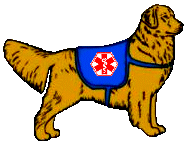
To Buy or Train Your Own?
This is an enormous question-one that can have an incredible impact on the entire family,above and beyond the "mere" addition of a service dog to the family and all that entails. While some programs do provide dogs at no charge,and others for a small donation,the majority of programs that supply dogs for the autistic charge huge sums for them-$10,000 to 15,000 being quite common. While I quite understand the necessity of being able to pay for good quality dogs,paying trainers,buying food,equipment and so on, when one considers that this is an animal with a rather short working lifespan of 8-10 years at the outside,I personally do not believe it is proper to burden a family with such an enormous debt,forcing them into financial hardship more often than not. I feel even more strongly about the oft suggested option of having the family fundraise the thousands of dollars needed for this-the reason is quite simple:personal dignity.
Many,many years the famous guide dog school,The Seeing Eye,made the decision to ask only a tiny fraction of the cost of the dog,rather than asking for full payment. They realised that the disabled and their families usually do not have incomes equal to those who do not have the additional finacial strain of caring for a disabled loved one. So The Seeing Eye made the wise choice-they ask a small fee,but they insisted that the disabled person pay it themselves,not their family,not friends and most especially not any charitable group,so that the person could start their life as independent as possible. The school did not care if it took the person years to pay the $150.00, even if they could only send in a little at a time....the point was that the person was personally responsible for applying for,training with and responsible for the care of the partner who would help them to a new life. Too often the program had seen people whose guide dogs had been bought for them by well meaning charities,and then the person was saddled with the burden of being "properly grateful" for the benovelonce of the organsisation. So,when the person and their service dog would go down the street, people would see them,and say,"oh,there goes the ---- Club Dog,isn't Joe lucky to have had their help!" Instead of being known as someone who can make their own way,the person is forced yet again to rely on the "charity" of others, instead of the satisfaction of making their own way. Disabled people are forced into depending on others too much as it is, so any amount of independence that can be achieved is precious to us,and what other reason is there to have a service dog than to be able to do as much as possible for oneself? By not being personally responsible for obtaining the means of ones independence aborts much of the purpose from the very beginning.
I do not fault any program that charges for the service dogs they train,my one thought is that it wrong to put that kind of hardship on anyone,least of all the disabled and their families. If a program wishes to supply dogs for any disability, I strongly believe that the burden of the cost of the dog should never be on the recipiant,beyond a minimal fee at most,but rather on sponsers of the school as a whole,so that no person,organisation or foundation can ever look at any particular team and say,"there goes our dog",and no disabled person feels obligated to others for his service dog.
Aside from the considerations of cost and dignity,there is an additional consideration,one that is little known or spoken of-that of failure. It is quite common to have a service dog team fail to bond for various reasons-the simplest being that of a bad match of dog to owner,and ranging on up to badly trained dog,poor health of the owner,to just not being able to establish the kind of relationship that is so vital to fully utilising a service dog. Add to this newer,more complex problems that now plague the SD industry of "programs" that offer families "service dog" puppies but retain ownership of the dog and with that the legal ablity to reposess the dog at a mere whim,devastating the disabled and their entire family; "programs" that claim to furnish service dogs that in reality do not meet the criteria set by the Americans With Disabilties Act,and so are essentially selling a pet for many thousands of dollars; "programs" that will tell you they can "certify" your pet as a "service dog" for a fee so that "you have a legal service dog"; and on and on. I have had the misfortune of having dealt personally with two such organisations,and have spoken to many who have been hurt by others,and know first hand the devastation that comes from these people who prey on those who only seek to become less of a burden to others. The worst of it is that these leeches are usually well connected,with deep pockets,that can afford lawyers that can pound into the dust anyone they choose that dares to speak of their dishonest methods....rare is the disabled person who can be able to afford to retain legal help in pursuing such injustice,and rarer still one that has the physical and emotional health to do so long enough to see justice done.
~ + ~ + ~+ ~
Now,all this being said,and the reader properly discouraged into thinking,"why bother,if it is not going to work out anyway?", please allow me to present the other side of the coin....that of the owner trained service dog.
In this,too,exist many of the same possiblities for failure,ranging from not finding the correct sort of dog for your needs,to finding what seems to be the dog of your dreams and having it turn out that it simply cannot do what is needed but would be a good pet, and on up to finding that you have the right dog,the training,but not the health to be able to utilise your partner to the extent that you had hoped,and so on. But I present this only as a precaution,not to discourage,so take heart! I strongly believe that, if it is possible, a disabled person should train their own service dog for a number of reasons-here are but a few of them:
* the abiltiy to choose for yourself the breed that best suits you- most programs,even the best, are limited in which breeds they are able to train, because they are constrained by the need to train for the widest possible number of people. Not everyone is able to cope with the sort of German Shepherds that The Seeing Eye trained in its first years....dogs who had been bred from stock used to long hours herding sheep,patrolling beside law enforcment officers or military work. While this ensured a strong dog with extreme intelligence,it also meant a dog that had to be kept busy or boredom would set in and the dogs often would become destructive or hyper,that needed a strong hand to keep the dog working at its best-not something that many were able to do. So most programs opt for breeds of much more sedate temperments,lower energy levels,and easier for the average person to handle. This is why Labradors and Golden Retrievers have come to dominate the service dog industry,because they are easiest to handle for the greatest number of potential students with the greatest rate of sucess. But when you decide to train your own,you are freed of this and can choose according to your personal tastes. I believe that most breeds of dogs can be trained successfully as service dogs-it is a matter of choosing the correct breed and individual to suit the necessary tasks. Breeds as diverse as Pit Bulls,Chihuahuas,Greyhounds,Papillions, Portugese Water Dogs,Rough Collies and Poodles are common as more disabled owners train service dogs for themselves,rather than depending on waiting for many years for a dog to be assigned to them by a program that may be from a breed you really do not care for. In many cases, there simply are no programs existing that train for many disabilties,because the sort of training is too specialised,such as for mental disablities,siezure detection and so on. Autism is one such-the needs of each person are so varied that I do not see how any program can hope to meet them all,since the needs of children change so rapidly as they progress and mature,and the needs of an adult on the autistic spectum are radically diffrent from one person to the next. Such intensely specialised training would simply not be possible for a program,certainly not at a cost that anyone could hope to pay for....hence the logic of one training one's own service dog.
* Owner training permits the crafting of tasks that suit needs unique to them,rather than a "preloaded menu" of tasks intended to suit the majority of students in a given school- each disabled person has needs that differ from another with the same diagnosis,and owner training permits one to personalise the dog as much as necessary,from the choosing of the working tack the dog wears,be it cape,vest,or type of harness,to how the dog is cued to perform any given task,from a commonly used command to a hand signal to perhaps no more than a nonverbal sound that none but the service dog recongnise as a command.
* Owner trained dogs generally bond more closely to the owner than those from programs- this is not universally true,but on the average it is. Again, it stems from familiarity-the owner/trainer has intimate knowledge of the entire process and of this individual dog,as compared to the student who goes to an established program to recieve a dog that has been trained in a set of tasks that suits the usual range of needs without overspecialising. And many who go to schools have never trained a dog to do more than perhaps roll over,and do not understand the level of attention and precision of handling that is necessary with a service dog-hence the common complaint heard by programs that 'my dog has stopped working/is ignoring me/etc/". Owner training necessates a level of understanding and study of the subject that not many with program dogs have before recieving their service dogs.
* Better understanding and communication with the dog-few people who obtain their service dogs from programs understand what went into the creation of the partner at their side,that this is far more than any other dog they have ever seen,and so they have little appreciation of what is necessary to properly handle the dog. Many seem to think that an SD is programmed like a computer,and once taught,will remember what to do for the rest of its life with no effort required on the owner's part. This is one reason for failures with program dogs-the lack of necessary knowledge of dogs on the part of the owner. When an SD is trained by their owner from the beginning,there is full knowledge of the entire process,of what steps were taken,where the strong and weak points are,and so how to correct and encourage the dog to do its best. A craftsman appreciates the work of his own hands,and the ultimate,I believe,is the creation of a service dog,of taking a puppy or young dog,and moulding it into something that will help you do what you cannot do yourself.
Mother Teresa once said,(in reference to God,of course,but applicable here,I think), "I can do what you cannot do,and you can do what I cannot. But together,we can do great things". What greater satisfaction can anyone have than going from being disabled and dependent on others to do things for you,to being able to do those same things once again with the assistance of a dog that you yourself have trained!
This,truly,is the ultimate in freedom!
© Patricia Gail Nichols
DePorres Service Dog Trainers Guild
Feb.17,2006



